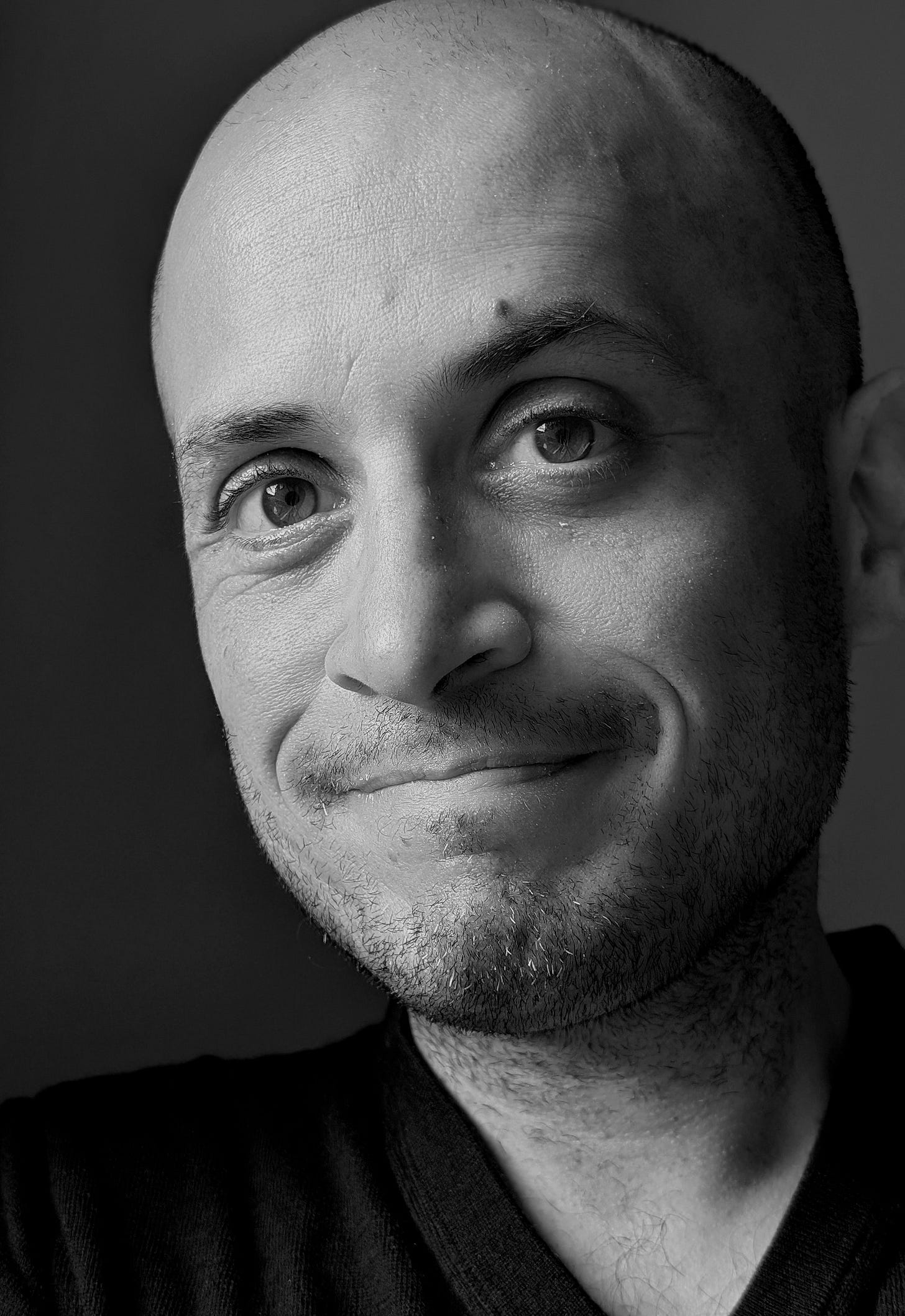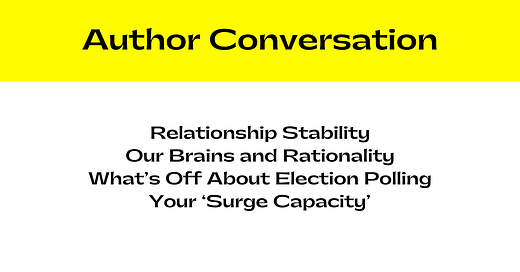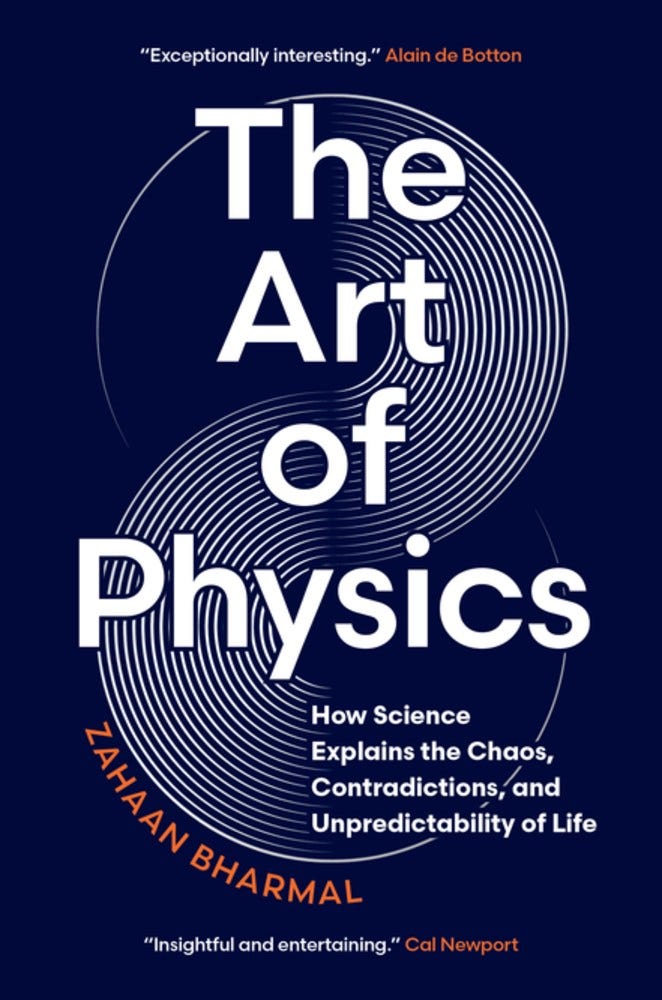How Physics Helps Us Learn About Relationships... and More
How fixed is our thinking, why don't election polls reliably work and what we should now about surge capacity
We can learn more about life than we assume from certain areas of studies. Take, for example, physics, which can answer maybe surprisingly answer questions about often-talked about topics, according to a new book.
In The Art of Physics: How Science Explains the Chaos, Contradictions and Unpredictability of Life, author Zahaan Bharmal talks about what insights that science can teach us about relationships, decisions, election polling (and talking to children).
Bharmal read physics at the University of Oxford, worked as a policy adviser and speech writer on Whitehall and at the World Bank and writes about science for the Guardian and now, at Substack. He is also the senior director of strategy at Google.
In his book, he draws on insights from quantum mechanics, thermodynamics, chaos theory and more. He talked to Communication Intelligence about the book and topics that may interest you.
Relationships Stability and Instability
“Before meeting my wife, I had a relatively short but volatile history of dating. I experienced both good and bad relationships. The difference, I realized, comes down to stability, a core idea in physics,” Bharmal begins.
“An example of a stable system is a ball resting in a valley. If you give the ball a small nudge, it rolls around but eventually settles back where it started. This is a lot like a stable relationship,” he explains.
“There’s room for disagreement, mistakes and even arguments but the underlying system is stable enough to absorb those shocks and return to balance.”
That’s not usually so for relationships that are in rough shape, Bharmal continues.
“Consider the same ball experiencing the same forces but this time perched on top of a hill. If you were to give it a small nudge, it would behave very differently, likely rolling all the way down the hill. In my experience, this is a lot like bad relationships, where one misplaced word, a small misunderstanding, could lead to a collapse,” Bharmal says.
This had led him to be reflective.

“This isn’t just a metaphor. Over the years, this idea from physics has helped me think more clearly about my own relationships: How do you build a valley instead of balancing on a hill?
“A valley doesn’t just appear; you have to carve it out over time. In relationships, that means creating patterns of trust, communication and shared experiences that help the relationship naturally return to stability. The more you reinforce these dynamics, the deeper the valley becomes.
“Stability isn’t about avoiding tension altogether; it’s about designing a system that can handle it,” Bharmal says.
Irrational Decisions
This part of the book too was inspired by his experiences and what he calls his “personal struggles” because, “I haven’t always made the best decisions,” Bharmal humbly says.
“That’s why I became fascinated by quantum cognition, a new area of research that applies quantum physics to human decision-making.”
He provides an example:
“Suppose I offer you a bet on a coin toss: heads, you win $200. Tails, you lose $100. Would you take it? Let’s say you did and then I offer you the same gamble a second time. Would your decision be influenced by whether you won or lost the first time,” Bharmal asks.
Studies show that “Those who lost the first bet were a little more cautious than those who won the first bet but were still more likely to want to gamble again,” he says. “But when people don’t know whether they won or lost the first bet, they become far less likely to gamble again.”
When he thinks about it, it’s perplexing.
“This doesn’t make any sense,” Bharmal asserts.
“It violates a principle of classical decision theory called the Sure Thing Principle, which says that if you would make the same choice in both known scenarios, winning or losing, then you should make the same choice, even if you don’t know the outcome. Yet, in practice, people hesitate.”
This naturally inspired him to think and ask, “why?”
“Quantum cognition argues that uncertainty fundamentally changes how we make decisions. In classical logic, we assume choices follow fixed probabilities and rational calculations. But the quantum world is predicated on uncertainty, where those assumptions break down,” Bharmal says.
The reality, he explains, is that “our brains don’t always hold fixed preferences.”
“Instead, our thoughts exist in a kind of superposition until we’re forced to make a decision. The moment we gain new information, like learning whether we won or lost a bet, our mental state collapses into a definite choice.”
He summarizes his point:
“For years, classical models of cognition have struggled to accurately predict the results of experiments like the coin toss. But remarkably, models from quantum cognition are able to make remarkably accurate predictions.
“And that raises a deeper question: are our so-called irrational decisions truly irrational? Or are they simply quantum in nature?”
The Unreliability of Election Polling: The Problem
There is a term called quantum politics, coined by Armen Sarkissian, the former president of Armenia and a theoretical physicist, who worked with Stephen Hawking.
“His point,” Bharmal explains, “is that the way we interpret politics hasn’t caught up with how we now understand the world through quantum physics.”
He goes deeper to provide clarity.
“Classical physics — Newton’s world — assumed linearity and predictability: if you knew the starting conditions, you could predict the outcome. That’s still how a lot of polling works today.
“But in quantum physics, things aren’t that simple. You can’t know both a particle’s position and momentum with certainty. The more you pin down one, the less you know about the other.
“Sarkissian argues that something similar happens in politics: when you ask someone how they plan to vote, you're not just collecting information, you’re influencing the system. The very act of asking can change the answer,” Bharmal says.
“I’ve seen this play out in my own work in marketing: in focus groups, people say one thing, but their actual behavior often tells a different story.”
He provides two examples from common societal communication and behavior.
“Ask a room full of parents if they feed their kids fast food and most will say ‘no.’ Yet McDonald’s is doing just fine. Or ask people about their online habits. Very few will admit to watching porn, yet it remains one of the most common search categories.”
There is something to be learned here.
“Don’t rely too heavily on what people say, look at what they actually do. And in politics, that’s hard,” Bharmal states.
“Polling struggles not because the data is bad, but because the world has become more quantum. It’s dynamic, entangled and unpredictable and the more you try to measure it, the more it changes,” he stresses.

The Critical Need for Surge Capacity in Your Life
We are aware of a surge protector. Bharmal briefly goes into a little more depth to illustrate a point about us as humans.
“In physics, there’s a concept called surge capacity, the extra buffer systems need to absorb shocks. Without it, even small failures can trigger total collapse,” he explains.
“Think of a power grid. When everything runs smoothly, we don’t think about it. But during a surge like a heatwave when millions of air conditioners switch on, the system can overload and shut down.
“To prevent this, power grids build in extra capacity, a safety margin that absorbs unexpected spikes in demand. Without it, a small disruption can cause a total blackout.”
He relates this to people.
“I realized, as a new (college) graduate, I had been living without any surge capacity,” Bharmal says. “Most of us do.
“We optimize everything: our schedules, our workflows, our to-do lists, assuming if we just push harder, we’ll be fine. But the truth is: the more we operate at our limits, the more fragile we become.”

This prompted him to think and ask himself, “So how do we build surge capacity for ourselves?” He presents an answer:
Time Slack: Don’t schedule every minute. Leave space for deep thinking and the unexpected.
Energy Reserves: Operating at 100% daily isn’t sustainable. Recovery time isn’t a luxury. It’s essential.
Career Options: Develop new skills, side projects and a strong network so you're never fully dependent on one job.
“Resilience isn’t about working harder,” Bharmal says. “It’s about having the capacity to absorb shocks when they come.”
The Core Point
The book is “about the hidden, beautiful, surprising ways in which ideas from physics can help us make sense of not just the physical world but the world of people too,” Bharmal says.
“I wanted to write something that was both personal and useful, something that might connect with people who’ve never thought of physics as something relevant to their daily lives.
“The book traces my own journey through career missteps, personal failures and moments of uncertainty and shows how physics helped me navigate them,” Bharmal says. “Ultimately, it’s about how to make sense of a messy, complex, uncertain world and how physics can help.”
This newsletter normally publishes Tuesday, Thursday and Sunday, with occasional articles on other days. To advertise, link to your business, sponsor an article or section of the newsletter or discuss your affiliate marketing program, contact CI.







